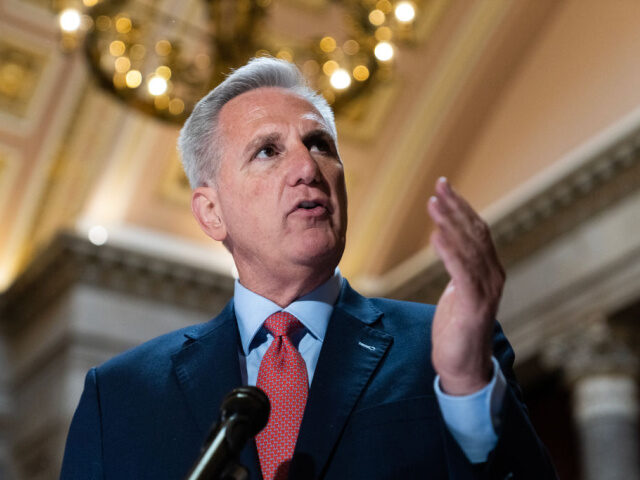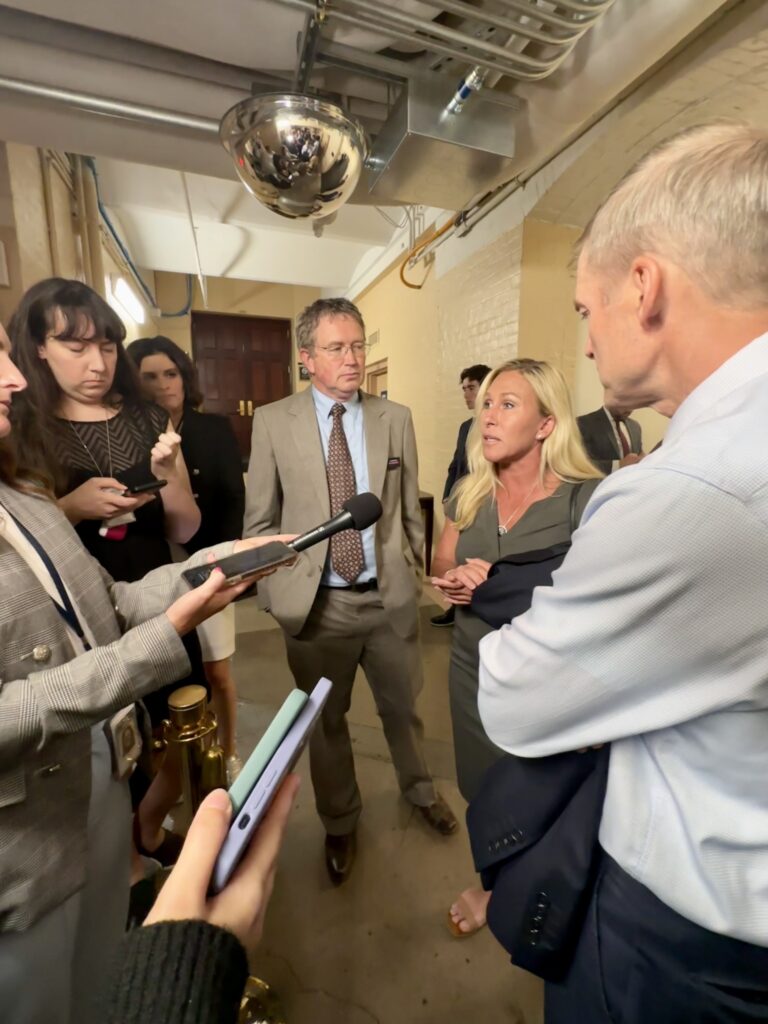House Republicans will decide Wednesday night if they support raising the debt ceiling, setting up a test of House Speaker Kevin McCarthy’s (R-CA) ability to win over a majority of his conference on a pivotal bipartisan bill.
Many Congress members returning to Washington on Tuesday signaled they supported the bill, while at least three dozen said they would oppose it. A handful outright revolted over the prospect of increasing the nation’s $31 trillion borrowing limit.
House Majority Leader Steve Scalise (R-LA) spoke about GOP leadership’s efforts to rally support behind the Fiscal Responsibility Act, a deal between House Republicans and President Joe Biden that would increase the debt limit through January 2025 while capping discretionary spending and implementing other GOP priorities like work requirements and resuming student loan payments.
“There were members this morning who were undecided who had some very valid questions, were given the information, and by tonight, they came up and spoke and said that they’re now going to vote for the bill,” Scalise said. “So I think you’re going to continue to see that vote grow. That’s what happens with any major bill.”
Congress has been under pressure to send a bill to Biden’s desk that both the Republican-controlled House and Democrat-controlled White House and Senate would support in time to stave off a possible debt default, which Treasury Secretary Janet Yellen warned could occur June 5.
Fractures within the House Freedom Caucus in particular became a focal point on Tuesday as the bill continued through its 72 hours of review, per House rules, and members began voicing their opinions on it.
Caucus members such as original cofounder Rep. Jim Jordan (R-OH) and the outspoken Rep. Marjorie Taylor Greene (R-GA) applauded the bill, while about ten of the roughly 40-member caucus fumed at a press conference over it, urging their GOP colleagues to oppose it.
One caucus member, Rep. Warren Davidson (R-OH), who is in his fourth term, praised the bill as the “most conservative spending bill that will become law since I’ve been here.”
While a majority of the Freedom Caucus still plans to vote against it, a source familiar with the matter said Jordan whipped against making opposing the bill an official position of the caucus, which would mean the caucus would recommend, but not require, those in the caucus who support it, like Jordan, Greene, Davidson, and others, to vote against it.
A couple hours prior to the final vote, after this story was published, the Freedom Caucus announced it had taken an official position, indicating Jordan’s whipping efforts were unsuccessful.
Asked about voting as a bloc, Rep. Byron Donalds (R-FL) said, “On this thing, it’s one of those bills that’s gonna be every member for themselves. That’s kind of what I think, every man for himself kind of thing.”
A spokesman for caucus chairman Scott Perry (R-PA) did not respond to a request for comment on the matter.
Caucus members also largely shut down the idea of using the rare motion to vacate procedure to oust McCarthy over the bill, but a few deviated from that position and showed openness to it.
In a members-only Freedom Caucus call Monday night, Rep. Ken Buck (R-CO) broached the matter, asking, “Will at some point the American people ask, ‘What is the House Freedom Caucus doing if it’s not willing to stand up to McCarthy and challenge his speakership?’”
Perry replied on the call that the caucus was “not there yet,” but the next day, Rep. Dan Bishop (R-NC) told Politico, “It is inescapable to me. It has to be done.”
Rep. Chip Roy (R-TX) told Glenn Beck, “If we can’t kill [the bill] on the floor tomorrow, then we’re going to have to regroup and figure out this whole leadership arrangement.”
By the end of Tuesday, however, Bishop and Roy appeared on an island, as others in the caucus would not entertain the idea of ousting McCarthy over the bill, particularly if a majority of the conference voted for it.
Rep. Ralph Norman (R-SC) said leadership was handling the bill “right” and that “it’s just a difference of opinion.”
On attempting to oust him, Norman said, “That’s not right,” while Jordan called it a “terrible idea.”
GOP leadership also won over a key non-Freedom Caucus member Tuesday. Rep. Thomas Massie (R-KY), a spending hawk who has become known for wearing a debt limit counter on his suit, announced he would support the bill.

Rep. Thomas Massie talks about his national debt button before the State of the Union address in the House Chamber on February 7, 2023. (Tom Williams/CQ-Roll Call, Inc via Getty Images)
The fact that his provision about restoring an appropriations process to fund the government at the end of the year was included in the bill was “remarkable,” he said.
Rep. Kevin Hern (R-OK), the current chairman of the Republican Study Committee, the largest GOP caucus, has not said how he will vote, while former chair Rep. Jim Banks (R-IN), who is running for Senate, came out against the bill Wednesday morning.
The vote, which is set to happen Wednesday night, is still expected to pass despite some Republican opposition after a 99-member moderate Democrat caucus and 67-member bipartisan caucus indicated they would vote in favor of it.
McCarthy, who received a standing ovation as he greeted the GOP conference in a meeting last night, is now aiming to achieve well over 50 percent of support from his conference for the bill, which would signal Republicans were successful in negotiations with Biden.
CORRECTION: Freedom Caucus “official positions” mean its members are recommended but not required to vote in line with that position. This story has been updated accordingly.
Write to Ashley Oliver at aoliver@breitbart.com. Follow her on Twitter at @asholiver.


COMMENTS
Please let us know if you're having issues with commenting.